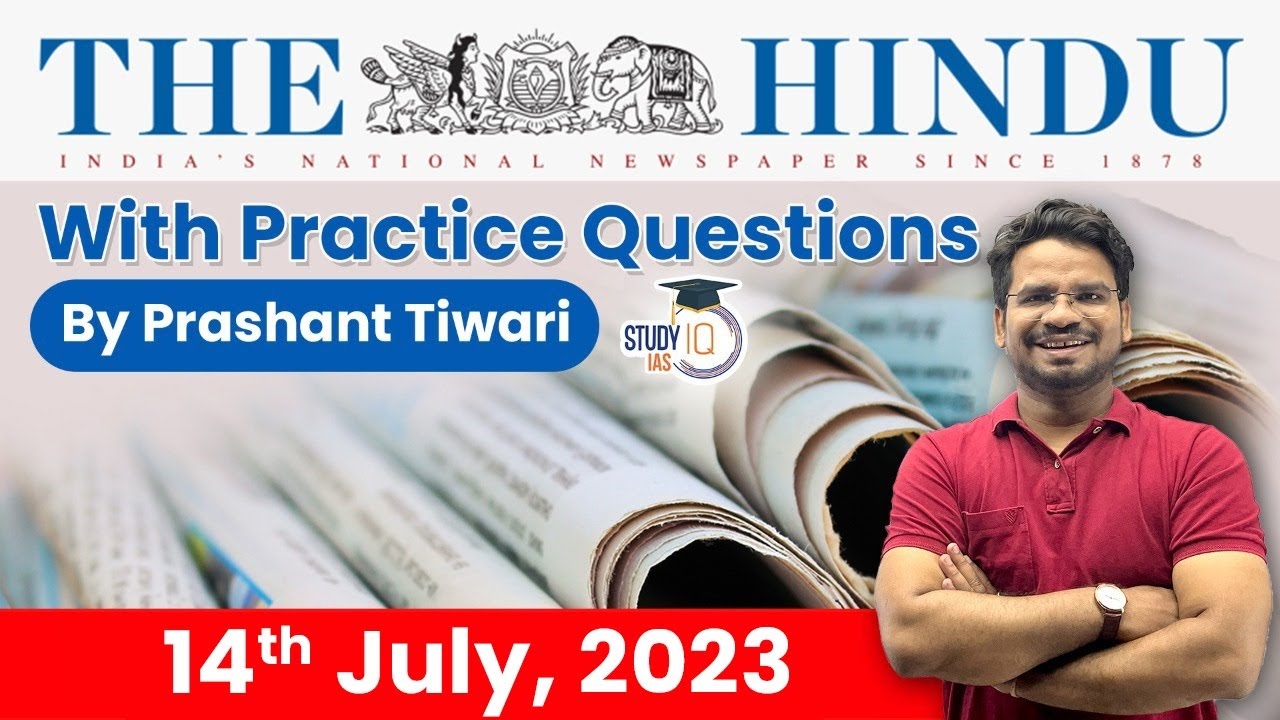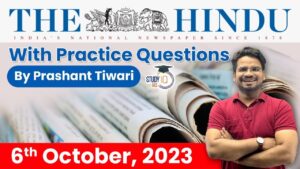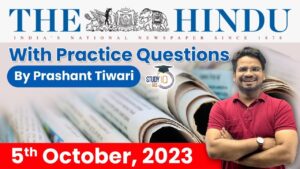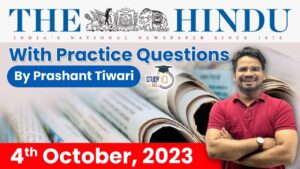The Hindu Newspaper Analysis for UPSC

The Hindu Newspaper Analysis 13 July 2023

- Hours before Prime Minister Narendra Modi was to land in Paris on Thursday, the Defence Acquisition Council (DAC), chaired by Defence Minister Rajnath Singh, accorded approval for the procurement of 26 Rafale-M fighters, which will be operated off the aircraft carriers, and three additional Scorpene-class diesel-electric submarines from France.
What is the Defense Acquisition Council?
- The DAC is the highest decision-making body in the Defence Ministry for deciding on new policies and capital acquisitions for the three services (Army, Navy and Air Force) and the Indian Coast Guard.
- The Minister of Defence is the Chairman of the Council.
- It was formed, after the Group of Ministers recommendations on ‘Reforming the National Security System’, in 2001, post Kargil War (1999).
- France has emerged as a key defence partner for India, becoming the second largest defence supplier in 2017- 2021.
- France has emerged as a major strategic partner for India with crucial defence deals and increased military to military engagement.
- Military Dialogues and Regularly held Joint Exercises:
- Varuna (navy), Garuda (air force), and Shakti (army)
- Both countries, as part of their joint efforts on climate change, launched the International Solar Alliance in 2015.
Ques – Discuss the steps that are India and France taking to enhance their bilateral relations and what are the potential benefits for both nations?

- Last week, more than 500 scientists and academics wrote to the Indian institute of Science (IISc) criticising its administration for prohibiting a discussion on the Unlawful Activities Prevention Act. In response, the director of a different research institute, the Indian Institute of Science, Education and Research (IISER) at Mohali, Punjab, issued a show cause notice to two faculty members at his institute who had signed the letter to the IISc.
- Scientific research institutes are part of the broader society; and so their members have the same constitutional right as others to participate in social discussions.
- For instance, an investigation of the science of climate change can naturally flow into complex geopolitical issues about colonialism and historical responsibility.
- Unlawful Activities (Prevention) Act – Passed in 1967, the law aims at effective prevention of unlawful activities associations in India.
- The Act assigns absolute power to the central government, by way of which if the Centre deems an activity as unlawful then it may, by way of an Official Gazette, declare it so.
- Key points:
- Under UAPA, both Indian and foreign nationals can be charged.
- It will be applicable to the offenders in the same manner, even if crime is committed on a foreign land, outside India.
- Under the UAPA, the investigating agency can file a charge sheet in maximum 180 days after the arrests and the duration can be extended further after intimating the court.

- Context – A judgment by the Allahabad High Court recently, declining the prayer by an inter-faith couple in a live-in relationship for protection from police harassment has caught national attention.
- First, the court is ostensibly carried away by the notions of conventional social morality rather than the constitutional principles on individual autonomy and personal liberty. Second, in the process, the court also discarded several Supreme Court judgments, even after citing them, by giving untenable reasons. Third, the High Court travelled much beyond the brief and relied on personal laws on marriage which were irrelevant.
- In S. Khushboo vs Kanniammal & Anr. (2010), the Supreme Court held: “While it is true that the mainstream view in our society is that sexual contact should take place only between marital partners, there is no statutory offence that takes place when adults willingly engage in sexual relations outside the marital setting”.



- Members of the North Atlantic Treaty Organization (NATO) met in Lithuania to take stock of their military and financial support to Ukraine in the face of Russian aggression there, but came away without offering any timetable to induct Ukraine, much to the chagrin of Ukrainian President Volodymyr Zelenskyy.
- Zelenskyy’s apparent sense of disappointment is likely to have been multiplied by the fact that as of April, Finland became the 31st member, and with Turkey withdrawing its objections, it is only a matter of time until Sweden signs its documents of accession.
- About:
- NATO, or the North Atlantic Treaty Organization, is a political and military alliance consisting of 31 member countries.
- It was formed in 1949 to promote mutual defence and collective security among its members.
- Members:
- In 1949, there were 12 founding members of the Alliance: Belgium, Canada, Denmark, France, Iceland, Italy, Luxembourg, the Netherlands, Norway, Portugal, the United Kingdom and the United States.
- Since then, 19 more countries have joined the Alliance: Greece and Turkey (1952); Germany (1955); Spain (1982); Czechia, Hungary and Poland (1999); Bulgaria, Estonia, Latvia, Lithuania, Romania, Slovakia and Slovenia (2004); Albania and Croatia (2009); Montenegro (2017); North Macedonia (2020); and Finland (2023).
- Headquarters: Brussels, Belgium.
- Headquarters of Allied Command Operations: Mons, Belgium.
- Special Provision:
- Article 5: Article 5 of the NATO treaty is a key provision that states that an attack on one member is an attack on all members.
- This provision has only been invoked once, after the 9/11 terrorist attacks in the United States.
- However, NATO’s protection does not extend to members’ civil wars or internal coups.

- “The Russia-Ukraine war is not our creation, or that of developing or emerging countries. It is not a priority for us…” Mr. Kant said. He listed India’s priorities as “development issues, growth, more financing from multilateral institutions, technological transformations and supporting the UN’s Sustainable Development Goals.”
- development, African Union membership were more important for India.
- Ukraine war not a priority of G-20 presidency, says India
- Origin:
- The G20 was formed in 1999 in the backdrop of the financial crisis of the late 1990s that hit East Asia and Southeast Asia in particular.
- Its aim was to secure global financial stability by involving middle-income countries.
- As stated by the official G20 Website:
- “On the advice of the G7 Finance Ministers, the G20 Finance Ministers and Central Bank Governors began holding meetings to discuss the response to the global financial crisis that occurred,”
- Objectives:
- Policy coordination between its members in order to achieve global economic stability, sustainable growth;
- To promote financial regulations that reduce risks and prevent future financial crises; and
- Members:
- Argentina, Australia, Brazil, Canada, China, France, Germany, Japan, India, Indonesia, Italy, Mexico, Russia, South Africa, Saudi Arabia, South Korea, Turkey, the United Kingdom, the United States, and the European Union.



- India’s third moon mission, Chandrayaan-3, is all set to be launched at 2.35 p.m. on Friday.
- The Indian Space Research Organisation (ISRO) has completed all pre-launch activities and the 25.30-hour countdown commenced on Thursday at the Satish Dhawan Space Centre in Sriharikota. The Launch Vehicle Mark-III (LVM3) will take off from the second launch pad of the space station in Sriharikota.
- India will once again make an attempt to do a soft landing on the lunar surface for the second time, having failed in 2019 with the Chandrayaan-2 mission.
- So far only three countries, the U.S., Russia and China, have successfully soft-landed on the moon.


 The Hindu Newspaper Analysis 6 October 2...
The Hindu Newspaper Analysis 6 October 2...
 The Hindu Newspaper Analysis 5 October 2...
The Hindu Newspaper Analysis 5 October 2...
 The Hindu Newspaper Analysis 4 October 2...
The Hindu Newspaper Analysis 4 October 2...





















